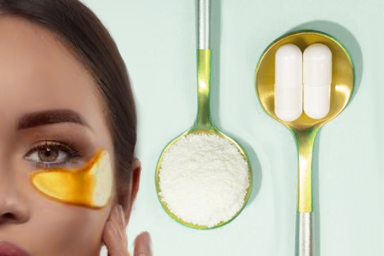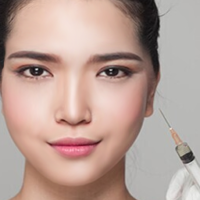What’s All the Hype About Collagen Supplements?
It seems like every year a new supplement hits the market, and the media suddenly starts touting it as the miracle pill that everyone “needs.” And if you actually took all of these supplements, well, you would be taking 10 or twenty pills a day!
This year’s media darling supplement is collagen – showing up everywhere from morning talk shows to Tik Tok. So, is collagen truly an essential supplement? And if so, are over-the-counter collagen supplements safe and effective?
In this article, the anti-aging experts at Tutera Medical in the Chandler, AZ area discuss why the body needs collagen, how it declines during menopause, and the best way to naturally help restore reduced levels of collagen with age.
What Does Collagen Do?
Collagen is the most plentiful protein in the human body. It serves as both the ‘glue’ and the ‘scaffolding’ that builds and supports strong, healthy skin, bones, joints, and organs.
But insufficient or reduced levels of collagen can lead to thinning, sagging, dry skin, increased wrinkles, and the development of ‘crepey’ looking skin. And collagen deficiency doesn’t just affect the skin on the face and neck. The vaginal walls and tissues will also start to thin and dry out without sufficient collagen.
Why Collagen Production Declines
After the age of 20, the skin produces 1% to 1.5% less collagen every year. This is a natural process known as “intrinsic ageing.”
However, the most marked decline in collagen production occurs during menopause, as a direct result of the body’s drop in estrogen levels. In fact, about 30% of skin collagen is lost in the first five years after menopause – which then continues to decline about 2% with each subsequent year.
By the age of 70, due to the significant decline in hormone levels, a woman’s skin has approximately one fourth of the collagen she had in her 20s.
The reason collagen production declines so much during menopause is well established. The skin cells that are responsible for stimulating collagen production (called fibroblasts) are only activated when they are exposed to estrogen. But estrogen’s primary purpose is to cause the lining of the uterus to thicken during the menstrual cycle to support pregnancy. So, when a woman’s reproductive years come to an end, her body stops producing as much estrogen. By menopause, a woman’s estrogen level is at half of what it was at her peak.
And as estrogen levels decline, the facial, vaginal, and pelvic tissues lose collagen – resulting in a rapid loss of tissue strength, thickness, and elasticity. This is why women often notice dramatic aging of the skin – as well as vaginal problems – during and after menopausal.
Why Collagen Supplements Often Don’t Work
Replenishing collagen is essential for counteracting the skin and vaginal changes that occur during menopause. Restoring collagen levels can help add to skin firmness, prevent wrinkles, maintain elasticity, and prevent skin and tissue dehydration by maintaining the skin barrier.
But turning to over-the-counter collagen supplements can be complicated and expensive – with no assurance that you are getting the right type and amount of collagen. This is because there are 28 different types of collagens in the human body, each with different functions!
Additionally, ingesting supplements is not the most efficient or effective method of delivering collagen to the skin. This is because ingested collagen is broken down into amino acids in the stomach during digestion, before being distributed across the body.
Similarly, topical application of collagen is also often ineffective, because collagen itself is often too large of a molecule to be properly absorbed into the skin.
Replace Missing Collagen with BHRT Instead of Supplements
Rather than turn to external supplements and creams to replace missing collagen – wouldn’t it be better to find a way to simply restart the body’s natural production of collagen? And that is exactly what hormone replacement therapy can do!
Since menopausal estrogen decline is the root cause of the body’s inability to maintain collagen production, simply replacing missing estrogen can reactivate the skin and tissue’s manufacture of collagen.
Recent medical research has demonstrated that replacing a woman’s deficient hormones improves skin and tissue thickness, plumpness, texture, tone, strength, elasticity, hydration, and smoothness. These clinical studies showed that women who had been prescribed bioidentical hormone replacement therapy BHRT) had younger-looking skin with fewer wrinkles, less sagging, and greater elasticity.
At Tutera Medical our hormone replacement therapy experts will conduct comprehensive blood testing to determine if a patient has insufficient or imbalanced levels of specific hormones, including estrogen. We may then prescribe a customized bioidentical hormone replacement therapy treatment plan to rebalance the woman’s hormones. And as estrogen levels are restored, the body’s fibroblast cells are once again stimulated to produce collagen. The result is typically more youthful skin, rejuvenation of thinning or lax vaginal tissue, and thicker hair, as well as improved overall health.
BHRT to Build Collagen | Scottsdale, AZ
For decades, hormone replacement therapy has been prescribed to improve vaginal health, treat mood swings, eliminate hot flashes, and much more. Now, it is understood that hormone balancing can also dramatically improve the appearance of skin.
The ant-aging experts at Tutera Medical in Scottsdale, AZ are nationally renowned leaders in hormone replacement therapy and anti-aging who can help you restore your skin to a more smooth, toned and youthful appearance with BHRT. If you are a perimenopausal or menopausal women whose skin is showing signs of aging, schedule an appointment today for a complete hormone workup panel and diagnosis – and see how hormone replacement and can help you rebuild collagen for more youthful and beautiful skin!












